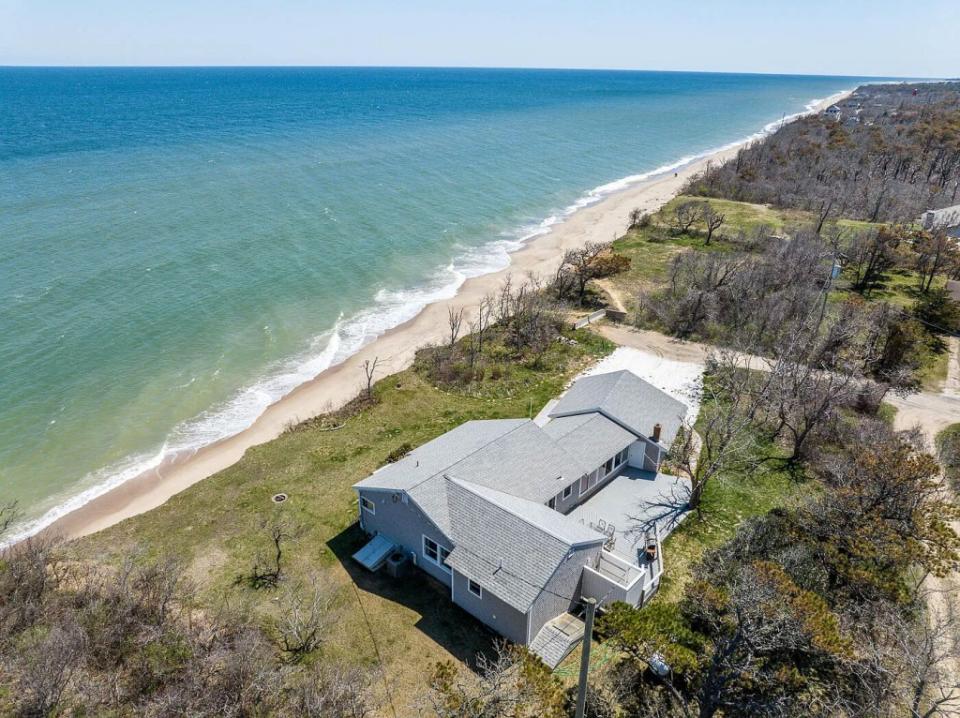David Moot had always fantasized about owning a beachfront retreat on Cape Cod, but never thought he could afford it—until he stumbled upon a coastal gem listed for just $395,000.
At roughly half the median sales price in the area according to recent estimates, the listing seemed too good to be true. And it was — the affordable slice of paradise at 157 Brownell Road in Eastham could soon be swept away by the Atlantic.
The charming, 3 BR, 2 BA cottage sits a mere 25 feet from an eroding bluff, with the tide line predicted to creep three feet closer each year. Within a decade, the home could be lost to the waves. Moot, 59, shrugged and took the plunge.

“Life’s too short,” he told Bloomberg in an interview. “Let’s just see what happens. It’s going to eventually fall into the ocean, and it may or may not be in my lifetime.”
Moot’s purchase is part of a growing trend in pricey oceanfront enclaves, where risk-tolerant bargain hunters are scooping up dream properties at rock-bottom prices.
On Nantucket, where the elite flock every summer, one seaside house assessed at $1.9 million recently sold for a shocking $200,000. (“Eventually the ocean will win,” new owner Don Vaccaro resignedly told the local paper.)
This new breed of beach buyers is gambling on a climate future that’s far from certain, as rising sea levels and more powerful storms put billions of dollars’ worth of prime real estate in jeopardy.
“Between 50 and 100 years from now, there are communities that will be underwater,” Dylan McNamara, an oceanography professor at the University of North Carolina Wilmington told Bloomberg. “It’s just a matter of time before those property values go down.”


In Nantucket, where winter storms have been gnawing away at the coastline, some areas have lost more than 12 feet of shoreline a year. The devastation has left homeowners facing tough choices.
“The hard conversation to have is with the owners,” Shelly Lockwood, a real estate agent on the island told the outlet. “They’re losing millions and thought they were going to leave this for their grandchildren. Now, their homes are worthless.”
Some properties are in such danger that the National Park Service has started buying them up and tearing them down — to prevent debris from littering the beaches.

The Outer Banks in North Carolina, a prime vacation spot, has already seen six homes collapse into the sea since 2020.
“They should have never been built,” Eric Braojos, a local real estate broker added. Even with the risk, demand for beachfront properties remains strong, especially in areas where towns have artificially widened beaches. But as insurance costs soar and lenders shy away from financing homes that could soon be underwater, property values are expected to tumble.
“If you want to buy the house, you’re going to have to pay all cash and you can’t insure it,” Lockwood warned. “That’s going to make the buyer pool that much smaller.”
For now, Moot is happy — even if that happiness comes with an expiration date.

And he’s thinking about ways to make the most of his time in the home — even toying with the idea of turning the cottage into a retreat for terminally ill patients, or opening the property up to day visitors, so they can soak in the beauty, too.
“This is such a wonderful dream for me that has come true that I would love to be able to share it,” he said. “I would like people to enjoy it as much as I can.”
EMEA Tribune is not involved in this news article, it is taken from our partners and or from the News Agencies. Copyright and Credit go to the News Agencies, email news@emeatribune.com Follow our WhatsApp verified Channel





